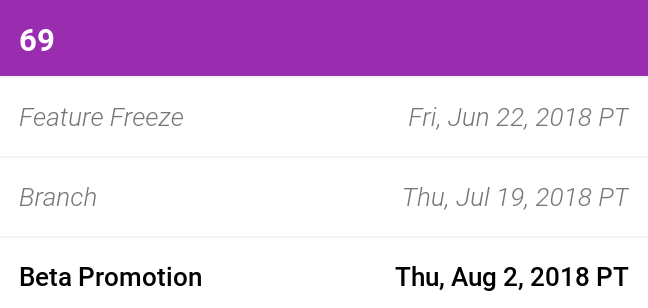After running Linux apps on my Pixelbook using the Dev Channel for the past few months, I’m looking forward to doing the same on the Beta Channel. And at last check, Chrome OS 69 is the version that should bring Project Crostini to that channel. It could happen this week.
Based on the Chromium OS schedule, the Beta version of Chrome OS 69 is slated for August 2, which is this Thursday.
 The schedule of release dates isn’t set in stone of course; any major testing bugs or other issues could impact the release date, so we’ll have to watch the Chrome Release blog to see if there’s an official announcement this week. In fact, Project Crostini was originally slated for Beta and Stable version 68, but Google pushed it back to 69 about a month ago.
The schedule of release dates isn’t set in stone of course; any major testing bugs or other issues could impact the release date, so we’ll have to watch the Chrome Release blog to see if there’s an official announcement this week. In fact, Project Crostini was originally slated for Beta and Stable version 68, but Google pushed it back to 69 about a month ago.
It may sound silly that I’m looking forward to the new version on the Beta Channel, but keep in mind: Running on the Dev Channel brings all sorts of other bugs and issues as the software matures. Yes, I’ll still have my Linux app support, so I’m not gaining much there. However, the new version will also bring some added stability as bugs found in the Dev Channel are squashed.
I don’t expect all of the yet unsupported features of Crostini to be added with the next Beta Channel software though. Based on a very recent presentation of Crostini, the development team is still working on items such as support for GPU acceleration and USB devices.
If all goes well with the new Beta Channel, look for all of the features to drop into a Stable Channel release on or around September 11.


6 Comments
As an IT professional, I am really looking forward to using the Linux apps. First impressions, when I tested it in Dev mode, I noticed that Debian 9 was installed in a virtual environment as opposed to running side by side like the crouton project. As it stands now, there doesn’t seem to be a way to manage the virtual environments nic settings, so if you run an ifconfig -a, the address returned is a NAT address from the VM. It would be nice to put it in bridged mode to be able run Linux tools on the network. I hope this feature will be added to the stable version. All in all, kutos to the Chrome OS dev team. Chromebooks have come a long way. I look forward to seeing the development of this project.
Where do you find the schedule of release dates? I’m familiar with http://www.chromium.org/developers/calendar but your screen shot above seems to come from somewhere fancier.
Here you go: the official Chromium Dashboard filled with good information and links: https://chromiumdash.appspot.com/home
That’s the Desktop release date, no? The ChromeOS release is usually a week later, I think. So the beta should drop August 9 or so.
That’s a good point; thanks for raising it! Indeed, the Beta Channel was just updated today….. to a new version of Chrome OS 68. Looks like we’re waiting a little bit longer!
Rich Goplin makes a great point. I’m looking forward to being able to directly modify the resources of the VM itself, but having Debian instances is a great start. Bridged versus NAT would be great as a configurable option. I imagine more control without the Chromebook becoming a dummy terminal or overrun with Debian-only use.
Noticing resource drains that would be easily resolved by prioritizing the VM a bit more, since so much more of my use is now in the Debian instances, versus the host environment. Also it’s not very clear how to interact *from* the Debian instance with the host environment, for example moving files from within the guest OS to the host OS. It goes the other way, but unclear on the other direction. Lots of little nuances.
But all this seems like the tip of the iceberg to a new era possibly, in some way or another, possibly computing as a whole. So I don’t interpret this as “the product lacking” I see it as a fairly graceful beginning.